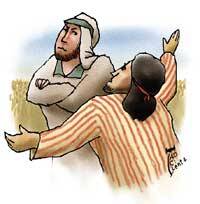Claiming Our Inheritance
One often hears of bitter disputes among siblings when it comes time to divide up the inheritance left by their parents. The parable Jesus tells begins on a shocking note—the younger brother demands his share before the father is even dead! The older brother stands there mute as the father, without a word of protest, gives each son his share. The elder brother’s objections come later, when his brother returns home and the former fears his own portion will be jeopardized. Both sons display a sense of entitlement. They have calculated what they have coming to them and they are making sure they collect all of it. This is not a poor family. They have cattle and means to put on a feast. The father has a fine robe, sandals and a ring to put on his son’s finger.
When the father hands over his considerable wealth to his sons, one would think they would be happy. But both end up miserable. The younger one squanders everything, while the older one hoards it all, not spending even a little bit to entertain his friends. Both complain about what they have not been given. The younger son, after using up all he had inherited, lowers his sights and would be satisfied with the slop fed to the swine, “but nobody gave him anything.” The elder son complains bitterly to his father: “You never gave me even a young goat to feast on with my friends.” This accusation is puzzling, given that the son already has been given everything the father has. It is equally surprising that the father, instead of angrily dismissing his son’s baseless accusations, responds with a renewed invitation to joy and a reminder: “Everything I have is yours”—already! But something has died in both sons. Their greed and jealousy have blinded them to the overflowing abundance that is theirs.
The first son has come back to life. He has hit rock bottom, believes he no longer deserves to be called son, and acknowledges the wrong he has done his father and the whole community. What has brought him back to life is not his own coming to his senses and his own efforts to return to the source of his heritage. Rather, it is the father’s unfailing love, as he seeks him out and flings open his arms, wrapping him in a mantle of forgiveness that resurrects in him the response of love and joy and gratitude, along with the sure knowledge that all is given freely and totally. This heritage cannot be earned and it is never depleted, even by our most egregious misuses.
As a figure of the divine, the father offers a gift of reconciliation that shatters the too-narrow vision of children vying for a bigger piece of the pie, when all along the whole of the inheritance is offered to each and all, with no bounds. This gift begins a process of healing that expands our puny estimation of our inheritance and opens our capacity to be transformed by the giver, enlarging our capacity to pass on that heritage to others.
Paul talks about this process as a “new creation.” The One who created an ever-expanding universe is ever drawing us deeper into the divine embrace, so as to extend that heritage outward in ever-widening circles. The question that is left unanswered at the end of the Gospel parable is whether or not the older son can accept the inheritance being offered him. The father will not give up on this son, who is filled with joyless resentment as he calculates what is owed him. The source of grace and compassion will wait as long as it takes for transformative love to do its recreative work.
This article also appeared in print, under the headline “Claiming Our Inheritance,” in the March 8, 2010, issue.








